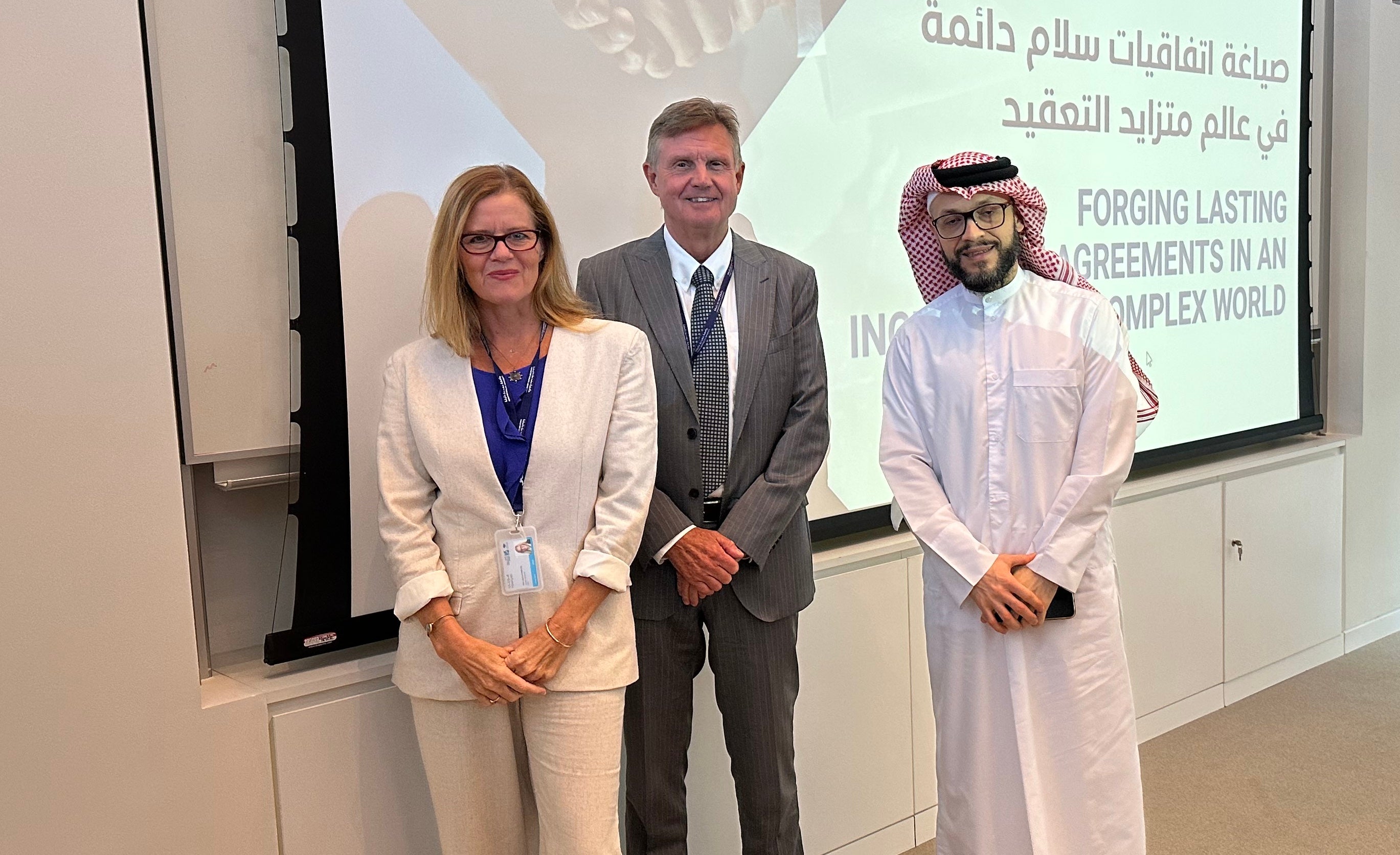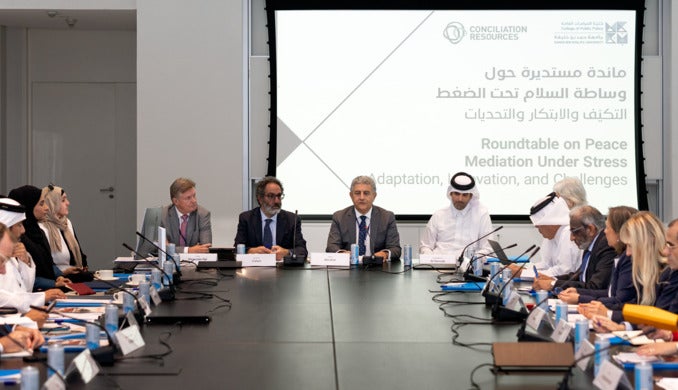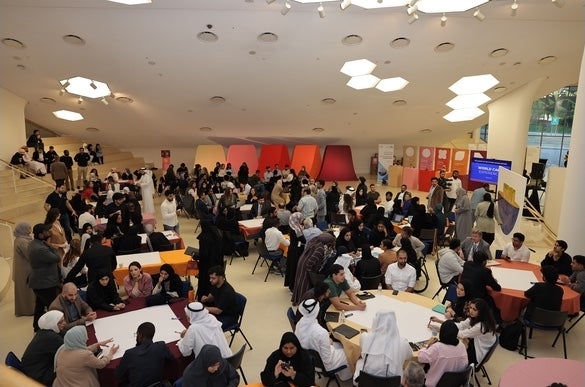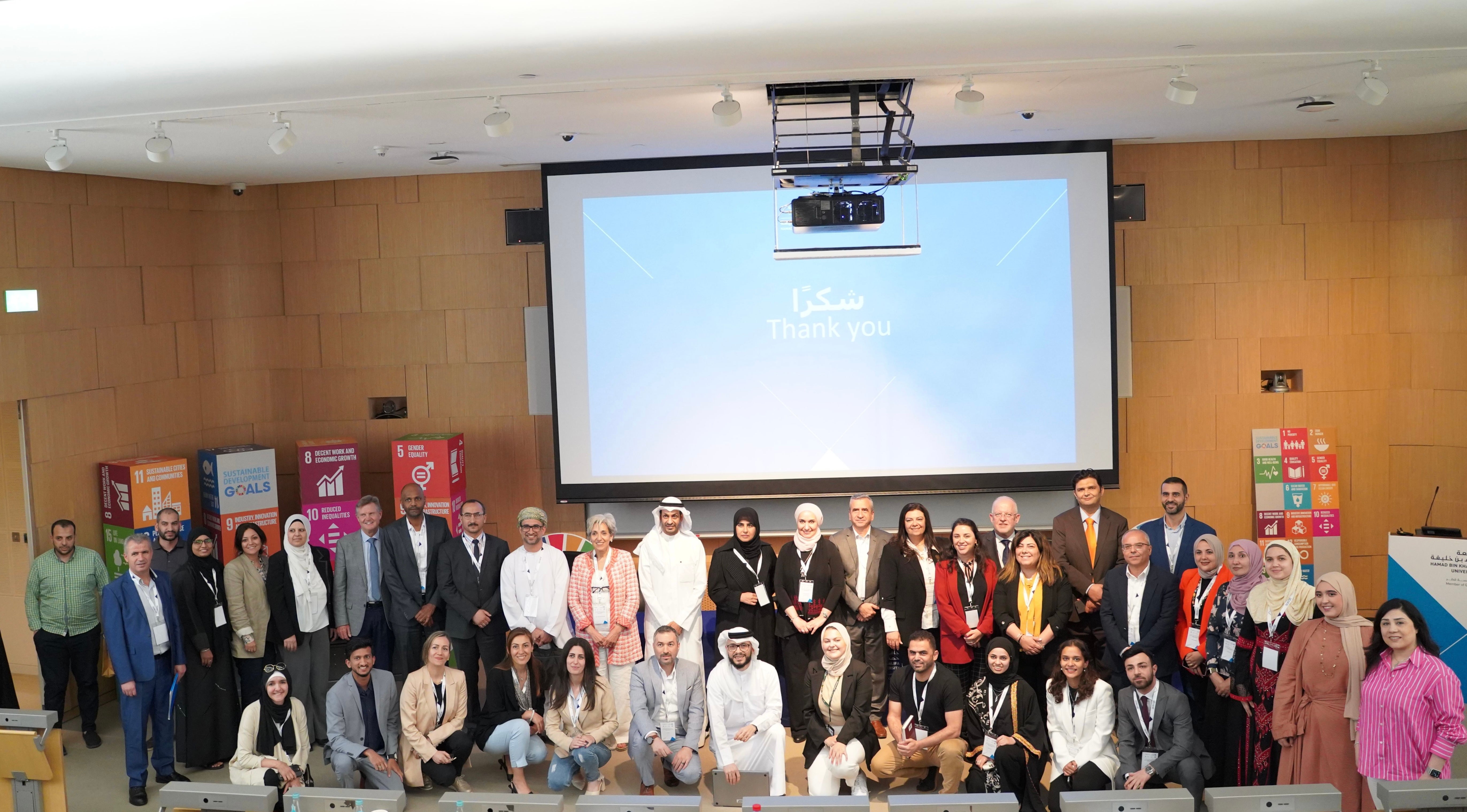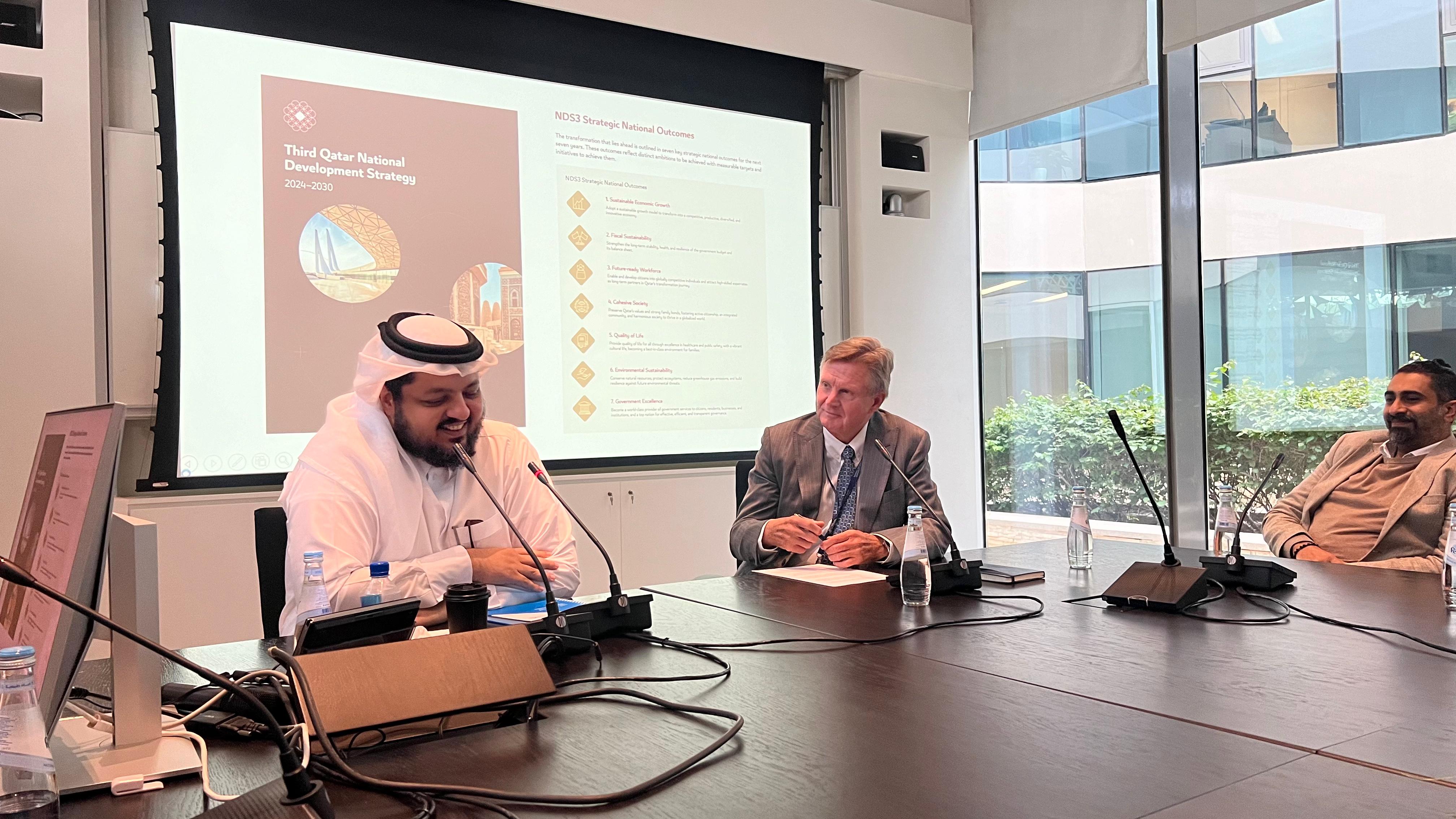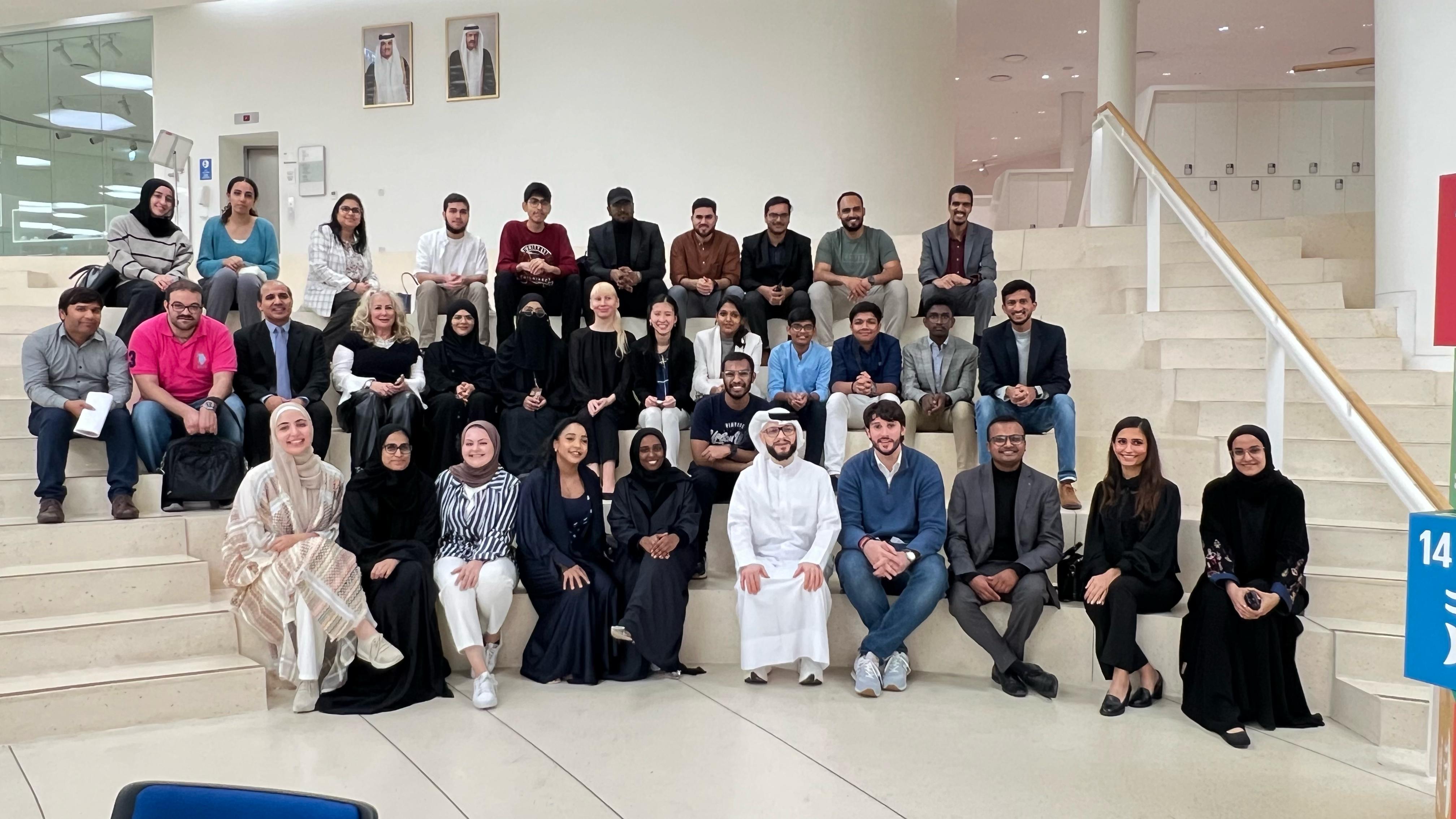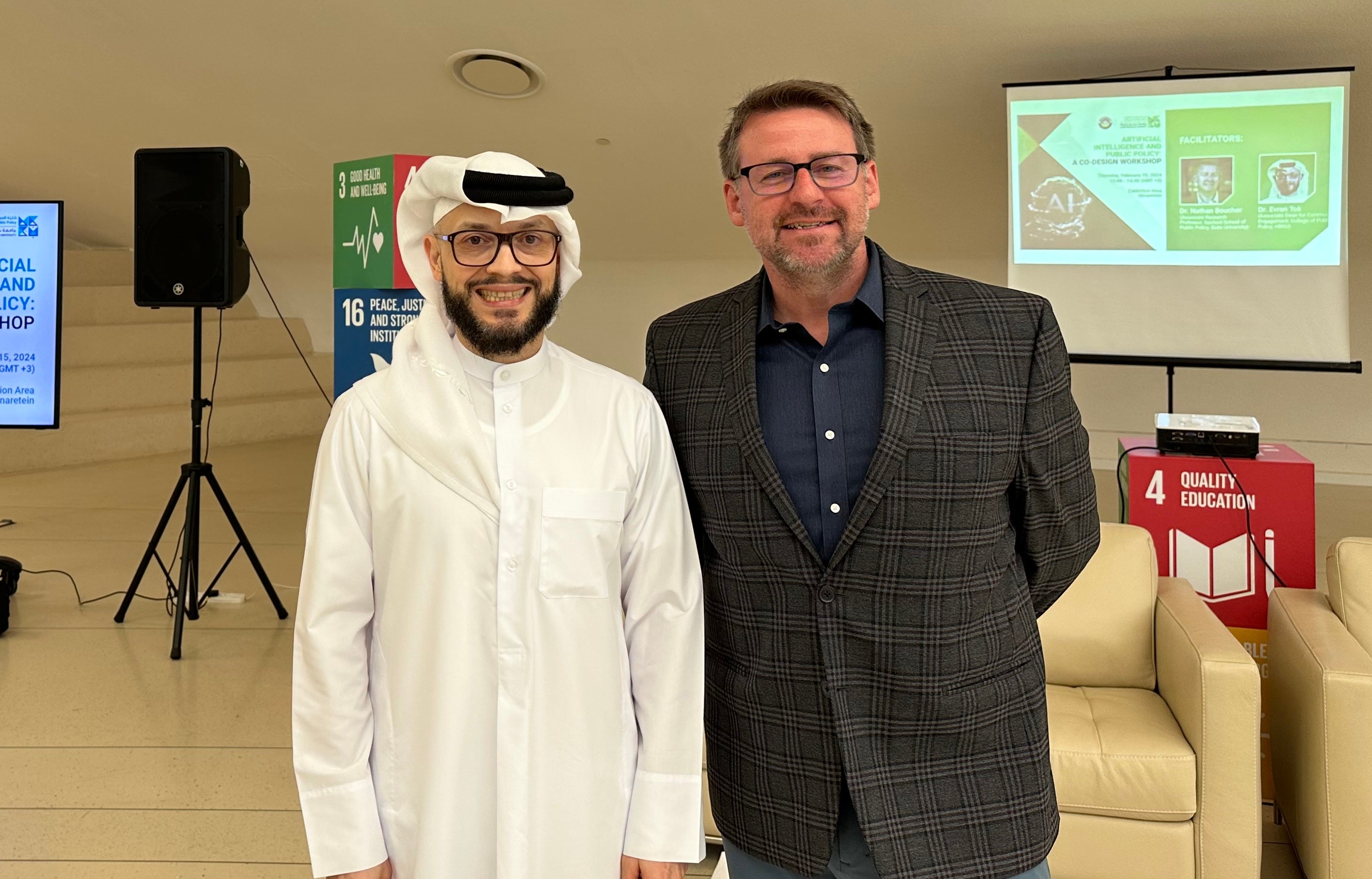
South Africa v. Israel before the International Court of Justice
College of Law, College of Public Policy, and Global Institute for Strategic Research Examine International Legal and Policy Implications
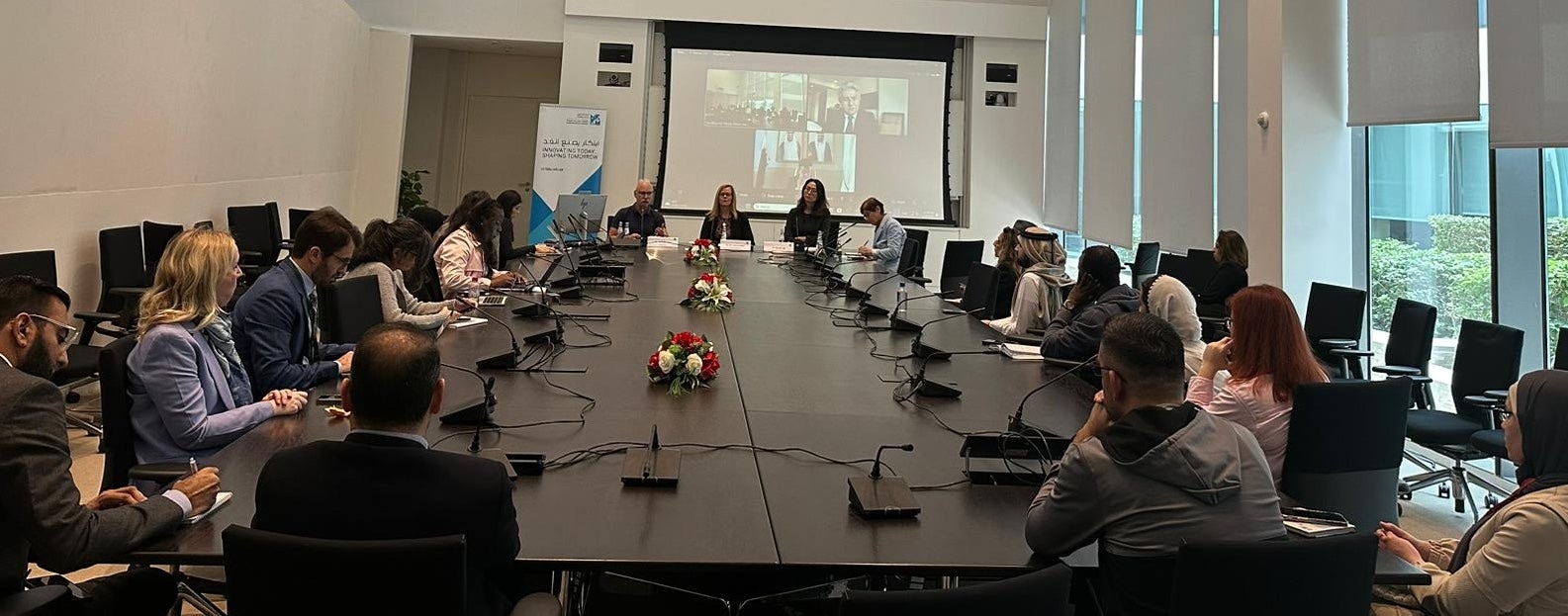
In response to the Gaza war and the attack on Palestinians, on December 29, 2023, South Africa filed an application for provisional measures against Israel in the International Court of Justice (ICJ) in The Hague. South Africa alleged that Israel was engaged in a genocide against the Palestinians in violation of the Convention on the Prevention and Punishment of the Crime of Genocide. The application sought an order of provisional measures that Israel cease military activity as well as other relief.
Given the situation’s urgency, the ICJ held a hearing on January 11 and 12, 2024. The hearing was live web-streamed from the ICJ.
The College of Law’s expertise in international law, including as to international courts, international humanitarian law, and international criminal law, guided a forum held an hour before the January 11th oral argument. Professors Ilias Bantekas and Ka Lok Yip shared insights into the issues likely to be addressed by the Court, such as jurisdiction, the role of evidence at the early stage of the case, the standard for granting provisional measures in genocide cases, and the possible order to be entered. Following the forum, students, faculty, alumni, and guests watched the presentation of the case before the Court, and during the viewing had the opportunity to ask questions to Professors Bantekas and Yip.
On January 26, 2024, the ICJ issued provisional measures that Israel “take all measures within its power to prevent the commission of all acts” of genocide as to its actions relating to the Palestinians in Gaza and undertake other measures. The ordered measures include a prohibition by the Israeli military of not committing acts of genocide, the obligation on Israel to prevent and punish the direct and public incitement of genocide, the obligation on Israel to enable the provision of urgently needed basic services and humanitarian assistance; the obligation to prevent destruction and ensure preservation of evidence; and the obligation to provide a report to the ICJ within one month of the Order as to all measures taken to give effect to the Order.
The ICJ’s decision was nearly unanimous. The Court did not order Israel to stop its military action and one could read most of the Order to say that Israel should comply with international law. Yet the Court found it had jurisdiction over a case brought by South Africa and expressly described the situation in Gaza as a “catastrophic humanitarian” one, which has substantial legal and political implications for Israel as well as other States.
The issuance of the January 26 Order gave HBKU a second opportunity to hold a public forum about the case. So, a few days after the Order’s issuance, the College of Law teamed up with the College of Public Policy (CPP) and Global Institute for Strategic Research (GISR) to examine the international legal and policy implications of the Order.
Launching the session was His Excellency Dr. Mutlaq Al-Qahtani, Ambassador Extraordinary and Plenipotentiary of the State of Qatar to the Netherlands, , who was in the courtroom in the Peace Palace when the ICJ issued the Order. Among other positions, including having served as Qatar’s Special Envoy of the Minister of Foreign Affairs for Counterterrorism and Mediation in Conflict Resolution, His Excellency was previously the Distinguished Visiting Professor of Public Value at CPP. Trained in international law, Ambassador Al-Qahtani, shared important insights into jurisdictional issues, given the erga omnes obligation not to engage in genocide, as well as to specific findings set forth in the Order.
Also providing background into the geopolitical situation was Dr. Sultan Barakat, Professor, CPP, and Acting Director, GISR, particularly as to events that had happened after issuance of the order. Professor Ilias Bantekas, an expert in international law, addressed the scope of the Order, its enforceability, and likely next steps in the case. Assistant Professor Ka Lok Yip, also an expert in international law with a focus on international humanitarian law and international criminal law, examined the relevance of specific findings in the Order under international humanitarian law and what they could mean for other possible proceedings/role of other States. Professor Erin McCandless, CPP’s current Distinguished Visiting Professor of Public Value, examined the challenges of and to the rules-based order that this situation reflects, and the implications for peace.
Dr. Leslie A. Pal, Founding Dean of CPP, noted the value of a cross-disciplinary examination of the issues as it “enabled the audience to understand the broad implications of the Order, the situation giving rise to it, and ongoing challenges.” College of Law Dean Susan L. Karamanian, who moderated both sessions, observed that “the sessions demonstrated the substantial depth of HBKU in international law and international relations and the ability of the faculty and invited guests to inform an audience about an international tragedy that is bringing untold harm to many.”
Related News
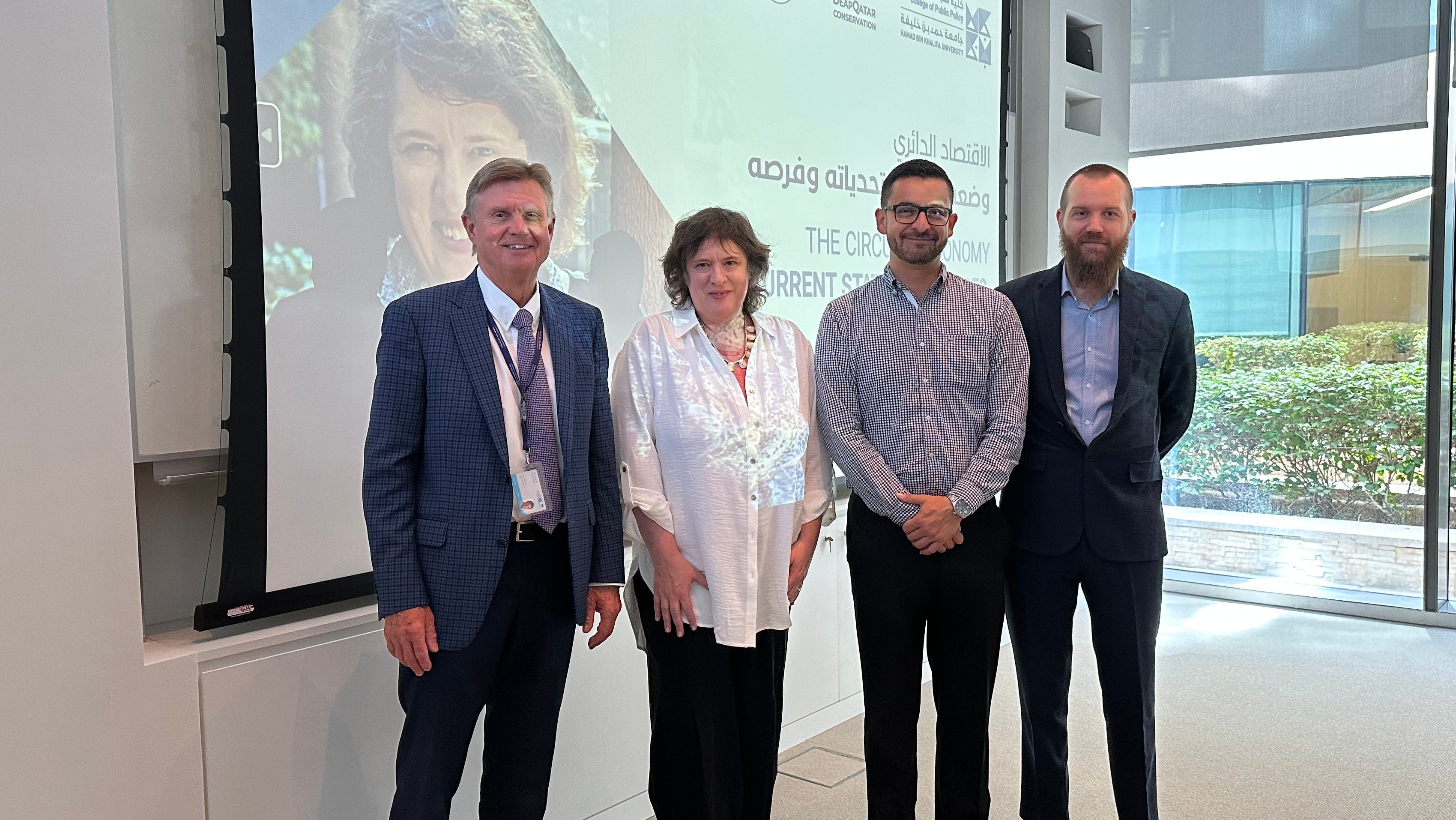
CPP, US Embassy in Doha, and DeapQatar Conservation Co-Host Circular Economy Lecture
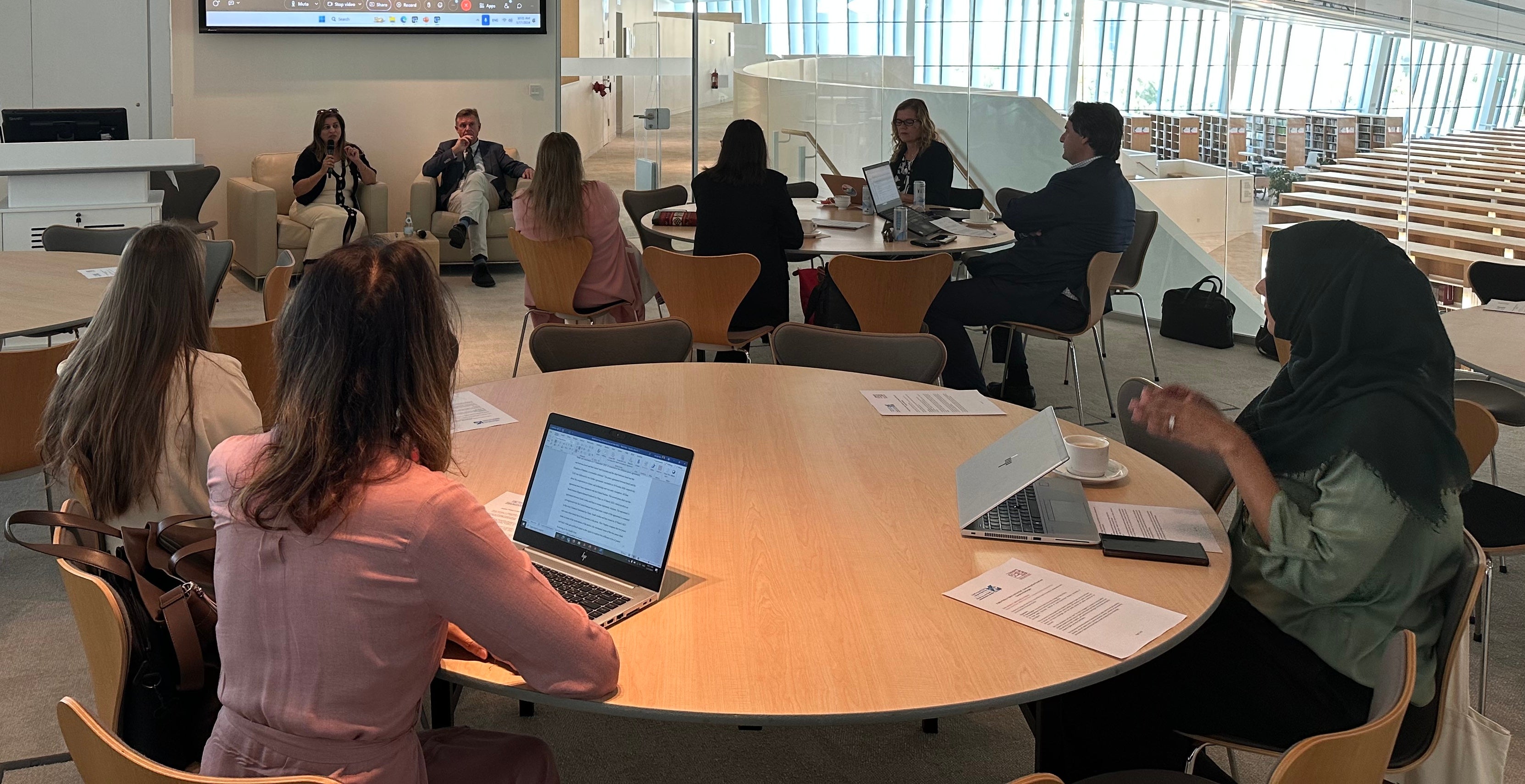
CPP, Doha Institute for Graduate Studies, and University of Birmingham Co-Host Symposium on Public Policy in the Gulf
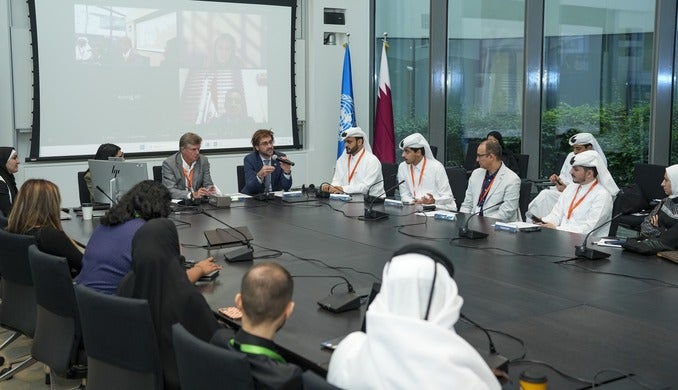
The United Nations Office of Counter-Terrorism and Leading Universities in Qatar Launch the Doha Youth Parliamentary Forum
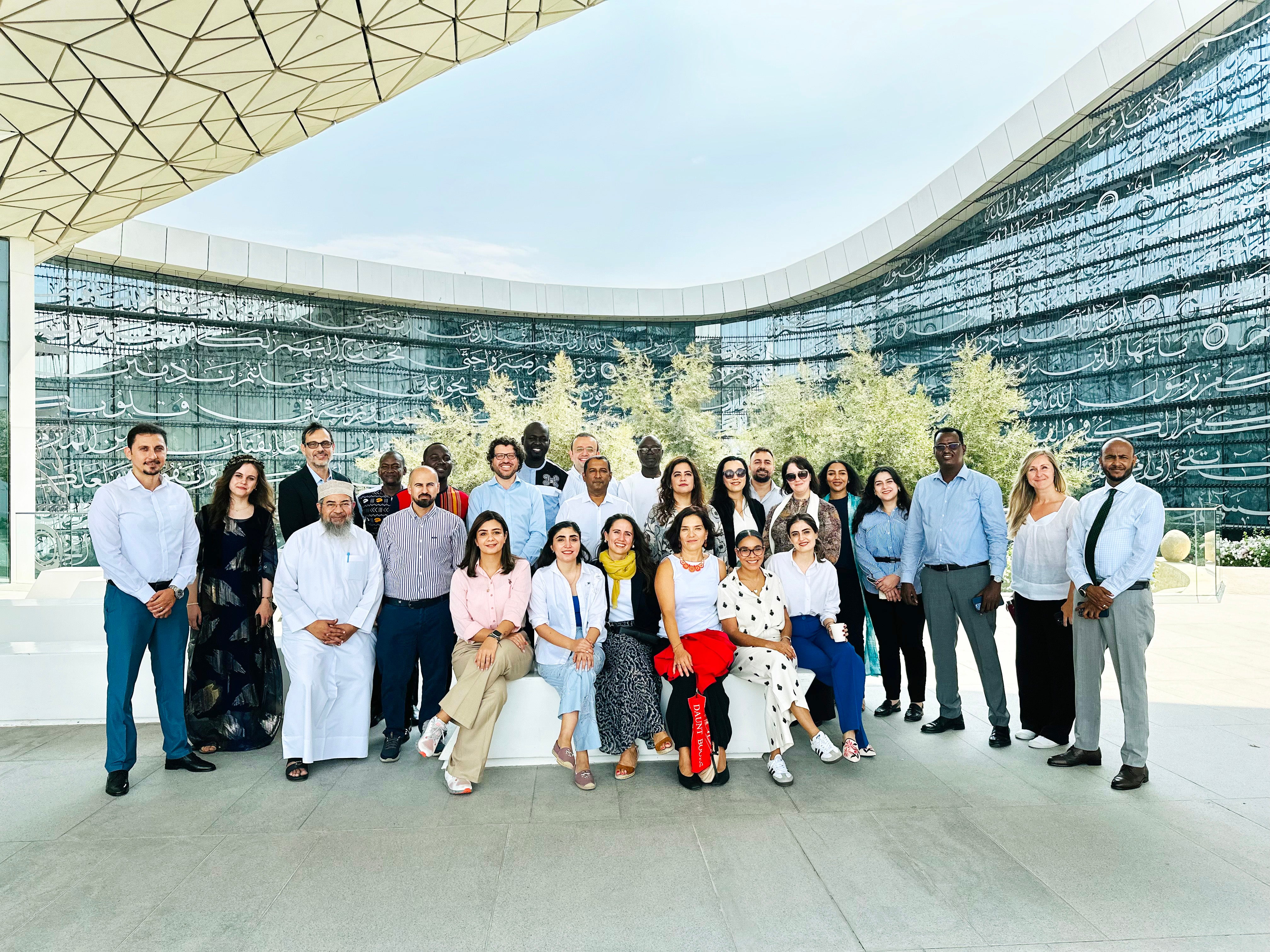
HBKU’s CPP and Geneva Graduate Institute Launch 2024-2025 Executive Programs in Development Policies and Practices
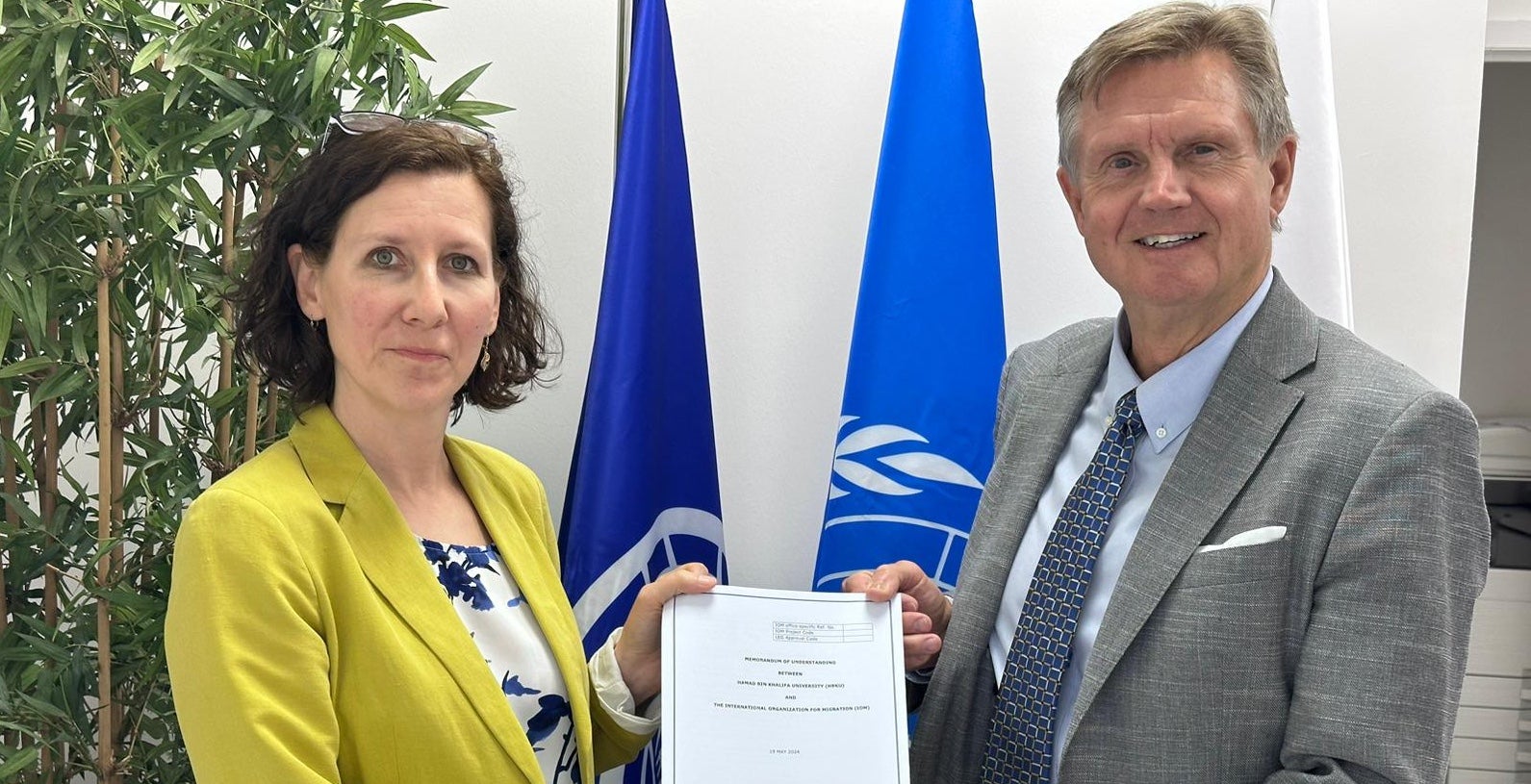
HBKU’s CPP Celebrates #TogetherinQatar Awards Ceremony after Signing MoU with the International Organization for Migration
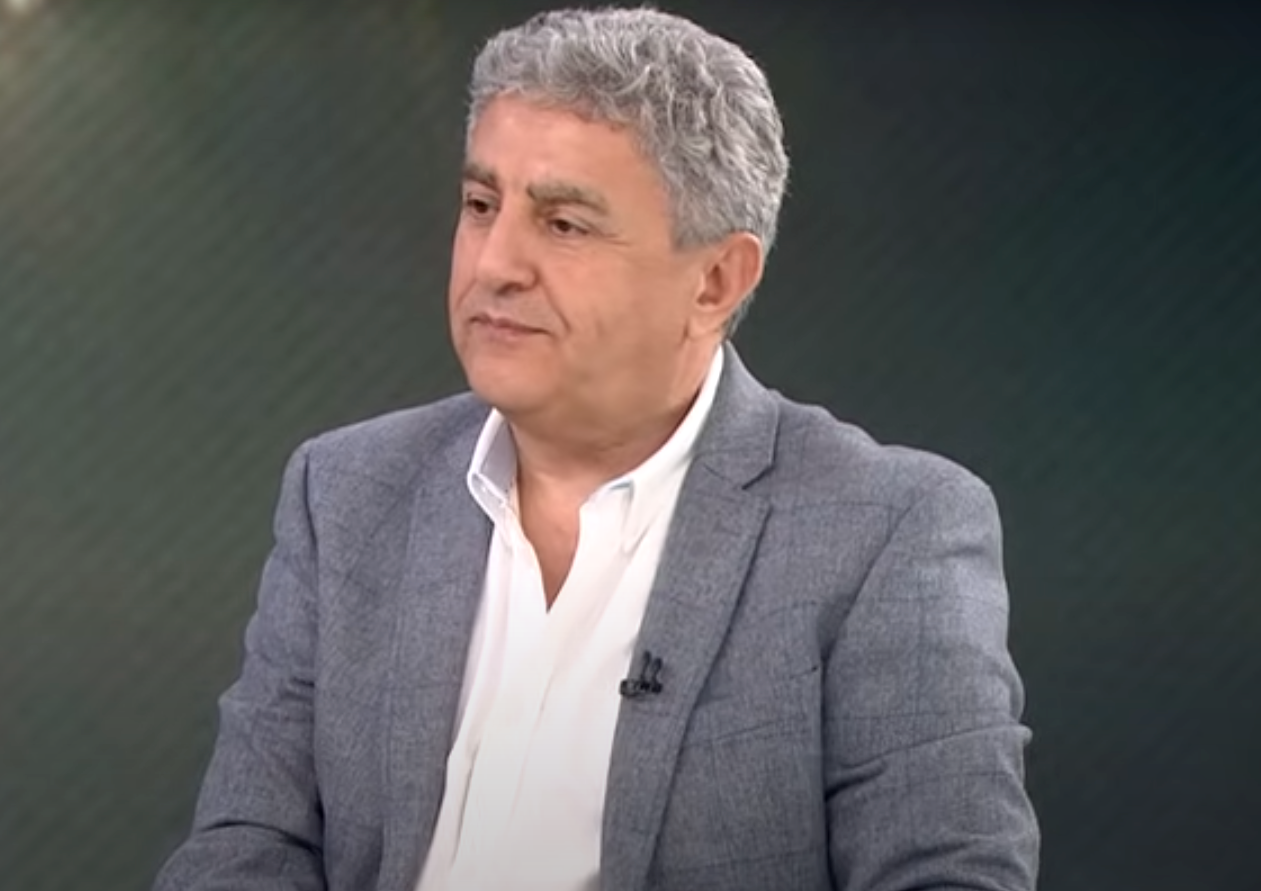
HBKU Professor Advises Global Policymakers on the Challenge of Engagement with the Taliban’s De-Facto Government
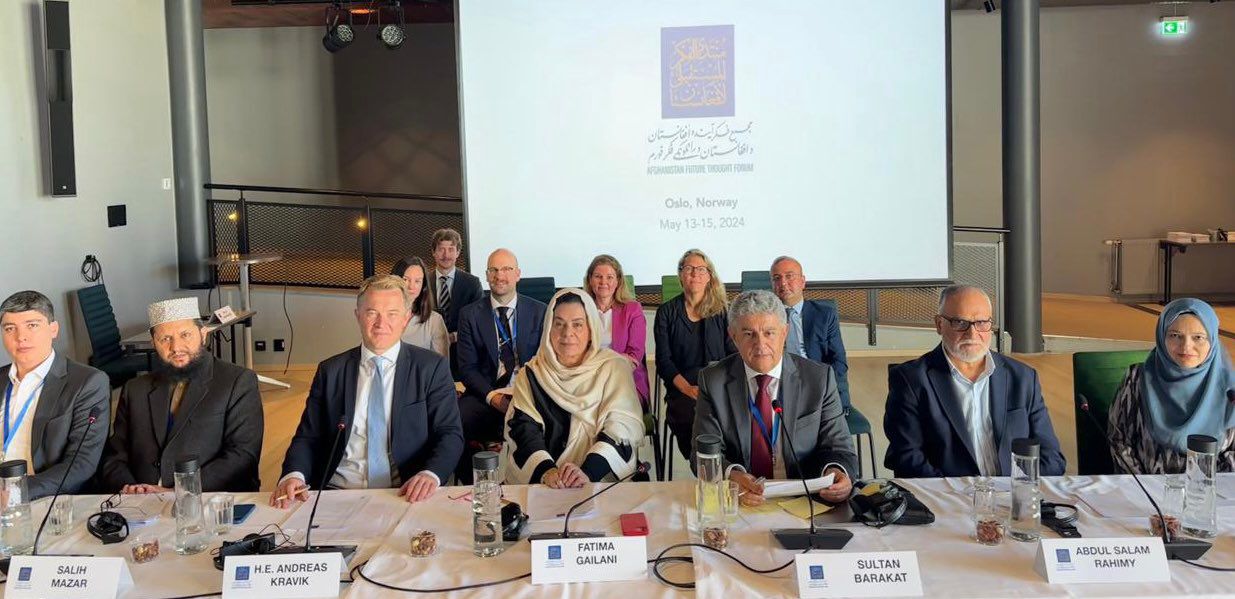
HBKU’s College of Public Policy Convenes the Ninth Session of the Afghanistan Future Thought Forum
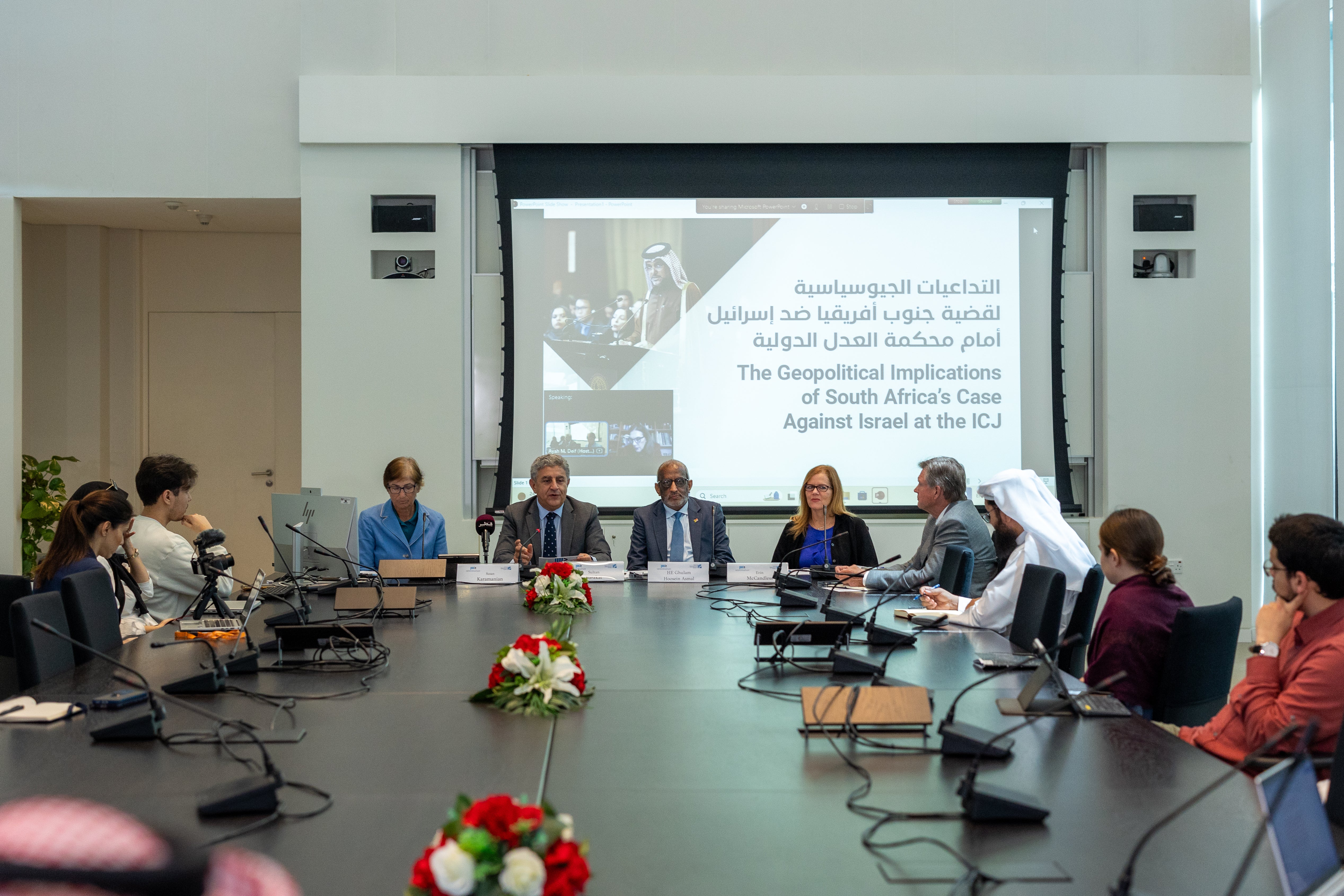
GISR Panel Analyzes Geopolitical Implications of South Africa’s Case against Israel at the ICJ

CPP Welcomes Erin McCandless as Distinguished Visiting Professor of Public Value

CPP, US Embassy in Doha, and DeapQatar Conservation Co-Host Circular Economy Lecture

CPP, Doha Institute for Graduate Studies, and University of Birmingham Co-Host Symposium on Public Policy in the Gulf

The United Nations Office of Counter-Terrorism and Leading Universities in Qatar Launch the Doha Youth Parliamentary Forum

HBKU’s CPP and Geneva Graduate Institute Launch 2024-2025 Executive Programs in Development Policies and Practices

HBKU’s CPP Celebrates #TogetherinQatar Awards Ceremony after Signing MoU with the International Organization for Migration

HBKU Professor Advises Global Policymakers on the Challenge of Engagement with the Taliban’s De-Facto Government

HBKU’s College of Public Policy Convenes the Ninth Session of the Afghanistan Future Thought Forum

GISR Panel Analyzes Geopolitical Implications of South Africa’s Case against Israel at the ICJ

CPP Welcomes Erin McCandless as Distinguished Visiting Professor of Public Value

CPP, US Embassy in Doha, and DeapQatar Conservation Co-Host Circular Economy Lecture

CPP, Doha Institute for Graduate Studies, and University of Birmingham Co-Host Symposium on Public Policy in the Gulf

The United Nations Office of Counter-Terrorism and Leading Universities in Qatar Launch the Doha Youth Parliamentary Forum

HBKU’s CPP and Geneva Graduate Institute Launch 2024-2025 Executive Programs in Development Policies and Practices

HBKU’s CPP Celebrates #TogetherinQatar Awards Ceremony after Signing MoU with the International Organization for Migration

HBKU Professor Advises Global Policymakers on the Challenge of Engagement with the Taliban’s De-Facto Government

HBKU’s College of Public Policy Convenes the Ninth Session of the Afghanistan Future Thought Forum

GISR Panel Analyzes Geopolitical Implications of South Africa’s Case against Israel at the ICJ

CPP Welcomes Erin McCandless as Distinguished Visiting Professor of Public Value

CPP, US Embassy in Doha, and DeapQatar Conservation Co-Host Circular Economy Lecture

CPP, Doha Institute for Graduate Studies, and University of Birmingham Co-Host Symposium on Public Policy in the Gulf

The United Nations Office of Counter-Terrorism and Leading Universities in Qatar Launch the Doha Youth Parliamentary Forum

HBKU’s CPP and Geneva Graduate Institute Launch 2024-2025 Executive Programs in Development Policies and Practices

HBKU’s CPP Celebrates #TogetherinQatar Awards Ceremony after Signing MoU with the International Organization for Migration

HBKU Professor Advises Global Policymakers on the Challenge of Engagement with the Taliban’s De-Facto Government

HBKU’s College of Public Policy Convenes the Ninth Session of the Afghanistan Future Thought Forum

GISR Panel Analyzes Geopolitical Implications of South Africa’s Case against Israel at the ICJ

CPP Welcomes Erin McCandless as Distinguished Visiting Professor of Public Value

CPP, US Embassy in Doha, and DeapQatar Conservation Co-Host Circular Economy Lecture

CPP, Doha Institute for Graduate Studies, and University of Birmingham Co-Host Symposium on Public Policy in the Gulf

The United Nations Office of Counter-Terrorism and Leading Universities in Qatar Launch the Doha Youth Parliamentary Forum

HBKU’s CPP and Geneva Graduate Institute Launch 2024-2025 Executive Programs in Development Policies and Practices

HBKU’s CPP Celebrates #TogetherinQatar Awards Ceremony after Signing MoU with the International Organization for Migration

HBKU Professor Advises Global Policymakers on the Challenge of Engagement with the Taliban’s De-Facto Government

HBKU’s College of Public Policy Convenes the Ninth Session of the Afghanistan Future Thought Forum

GISR Panel Analyzes Geopolitical Implications of South Africa’s Case against Israel at the ICJ

CPP Welcomes Erin McCandless as Distinguished Visiting Professor of Public Value

CPP, US Embassy in Doha, and DeapQatar Conservation Co-Host Circular Economy Lecture

CPP, Doha Institute for Graduate Studies, and University of Birmingham Co-Host Symposium on Public Policy in the Gulf

The United Nations Office of Counter-Terrorism and Leading Universities in Qatar Launch the Doha Youth Parliamentary Forum

HBKU’s CPP and Geneva Graduate Institute Launch 2024-2025 Executive Programs in Development Policies and Practices

HBKU’s CPP Celebrates #TogetherinQatar Awards Ceremony after Signing MoU with the International Organization for Migration

HBKU Professor Advises Global Policymakers on the Challenge of Engagement with the Taliban’s De-Facto Government

HBKU’s College of Public Policy Convenes the Ninth Session of the Afghanistan Future Thought Forum

GISR Panel Analyzes Geopolitical Implications of South Africa’s Case against Israel at the ICJ

CPP Welcomes Erin McCandless as Distinguished Visiting Professor of Public Value

CPP, US Embassy in Doha, and DeapQatar Conservation Co-Host Circular Economy Lecture

CPP, Doha Institute for Graduate Studies, and University of Birmingham Co-Host Symposium on Public Policy in the Gulf

The United Nations Office of Counter-Terrorism and Leading Universities in Qatar Launch the Doha Youth Parliamentary Forum

HBKU’s CPP and Geneva Graduate Institute Launch 2024-2025 Executive Programs in Development Policies and Practices

HBKU’s CPP Celebrates #TogetherinQatar Awards Ceremony after Signing MoU with the International Organization for Migration

HBKU Professor Advises Global Policymakers on the Challenge of Engagement with the Taliban’s De-Facto Government

HBKU’s College of Public Policy Convenes the Ninth Session of the Afghanistan Future Thought Forum

GISR Panel Analyzes Geopolitical Implications of South Africa’s Case against Israel at the ICJ

CPP Welcomes Erin McCandless as Distinguished Visiting Professor of Public Value

CPP, US Embassy in Doha, and DeapQatar Conservation Co-Host Circular Economy Lecture

CPP, Doha Institute for Graduate Studies, and University of Birmingham Co-Host Symposium on Public Policy in the Gulf

The United Nations Office of Counter-Terrorism and Leading Universities in Qatar Launch the Doha Youth Parliamentary Forum

HBKU’s CPP and Geneva Graduate Institute Launch 2024-2025 Executive Programs in Development Policies and Practices

HBKU’s CPP Celebrates #TogetherinQatar Awards Ceremony after Signing MoU with the International Organization for Migration

HBKU Professor Advises Global Policymakers on the Challenge of Engagement with the Taliban’s De-Facto Government

HBKU’s College of Public Policy Convenes the Ninth Session of the Afghanistan Future Thought Forum

GISR Panel Analyzes Geopolitical Implications of South Africa’s Case against Israel at the ICJ

CPP Welcomes Erin McCandless as Distinguished Visiting Professor of Public Value

CPP, US Embassy in Doha, and DeapQatar Conservation Co-Host Circular Economy Lecture

CPP, Doha Institute for Graduate Studies, and University of Birmingham Co-Host Symposium on Public Policy in the Gulf

The United Nations Office of Counter-Terrorism and Leading Universities in Qatar Launch the Doha Youth Parliamentary Forum

HBKU’s CPP and Geneva Graduate Institute Launch 2024-2025 Executive Programs in Development Policies and Practices

HBKU’s CPP Celebrates #TogetherinQatar Awards Ceremony after Signing MoU with the International Organization for Migration

HBKU Professor Advises Global Policymakers on the Challenge of Engagement with the Taliban’s De-Facto Government

HBKU’s College of Public Policy Convenes the Ninth Session of the Afghanistan Future Thought Forum

GISR Panel Analyzes Geopolitical Implications of South Africa’s Case against Israel at the ICJ

CPP Welcomes Erin McCandless as Distinguished Visiting Professor of Public Value

CPP, US Embassy in Doha, and DeapQatar Conservation Co-Host Circular Economy Lecture

CPP, Doha Institute for Graduate Studies, and University of Birmingham Co-Host Symposium on Public Policy in the Gulf

The United Nations Office of Counter-Terrorism and Leading Universities in Qatar Launch the Doha Youth Parliamentary Forum

HBKU’s CPP and Geneva Graduate Institute Launch 2024-2025 Executive Programs in Development Policies and Practices

HBKU’s CPP Celebrates #TogetherinQatar Awards Ceremony after Signing MoU with the International Organization for Migration

HBKU Professor Advises Global Policymakers on the Challenge of Engagement with the Taliban’s De-Facto Government

HBKU’s College of Public Policy Convenes the Ninth Session of the Afghanistan Future Thought Forum

GISR Panel Analyzes Geopolitical Implications of South Africa’s Case against Israel at the ICJ

CPP Welcomes Erin McCandless as Distinguished Visiting Professor of Public Value

CPP, US Embassy in Doha, and DeapQatar Conservation Co-Host Circular Economy Lecture

CPP, Doha Institute for Graduate Studies, and University of Birmingham Co-Host Symposium on Public Policy in the Gulf

The United Nations Office of Counter-Terrorism and Leading Universities in Qatar Launch the Doha Youth Parliamentary Forum

HBKU’s CPP and Geneva Graduate Institute Launch 2024-2025 Executive Programs in Development Policies and Practices

HBKU’s CPP Celebrates #TogetherinQatar Awards Ceremony after Signing MoU with the International Organization for Migration

HBKU Professor Advises Global Policymakers on the Challenge of Engagement with the Taliban’s De-Facto Government

HBKU’s College of Public Policy Convenes the Ninth Session of the Afghanistan Future Thought Forum

GISR Panel Analyzes Geopolitical Implications of South Africa’s Case against Israel at the ICJ

CPP Welcomes Erin McCandless as Distinguished Visiting Professor of Public Value

CPP, US Embassy in Doha, and DeapQatar Conservation Co-Host Circular Economy Lecture

CPP, Doha Institute for Graduate Studies, and University of Birmingham Co-Host Symposium on Public Policy in the Gulf

The United Nations Office of Counter-Terrorism and Leading Universities in Qatar Launch the Doha Youth Parliamentary Forum

HBKU’s CPP and Geneva Graduate Institute Launch 2024-2025 Executive Programs in Development Policies and Practices

HBKU’s CPP Celebrates #TogetherinQatar Awards Ceremony after Signing MoU with the International Organization for Migration

HBKU Professor Advises Global Policymakers on the Challenge of Engagement with the Taliban’s De-Facto Government

HBKU’s College of Public Policy Convenes the Ninth Session of the Afghanistan Future Thought Forum

GISR Panel Analyzes Geopolitical Implications of South Africa’s Case against Israel at the ICJ

CPP Welcomes Erin McCandless as Distinguished Visiting Professor of Public Value

CPP, US Embassy in Doha, and DeapQatar Conservation Co-Host Circular Economy Lecture

CPP, Doha Institute for Graduate Studies, and University of Birmingham Co-Host Symposium on Public Policy in the Gulf

The United Nations Office of Counter-Terrorism and Leading Universities in Qatar Launch the Doha Youth Parliamentary Forum

HBKU’s CPP and Geneva Graduate Institute Launch 2024-2025 Executive Programs in Development Policies and Practices

HBKU’s CPP Celebrates #TogetherinQatar Awards Ceremony after Signing MoU with the International Organization for Migration

HBKU Professor Advises Global Policymakers on the Challenge of Engagement with the Taliban’s De-Facto Government

HBKU’s College of Public Policy Convenes the Ninth Session of the Afghanistan Future Thought Forum

GISR Panel Analyzes Geopolitical Implications of South Africa’s Case against Israel at the ICJ

CPP Welcomes Erin McCandless as Distinguished Visiting Professor of Public Value

CPP, US Embassy in Doha, and DeapQatar Conservation Co-Host Circular Economy Lecture

CPP, Doha Institute for Graduate Studies, and University of Birmingham Co-Host Symposium on Public Policy in the Gulf

The United Nations Office of Counter-Terrorism and Leading Universities in Qatar Launch the Doha Youth Parliamentary Forum

HBKU’s CPP and Geneva Graduate Institute Launch 2024-2025 Executive Programs in Development Policies and Practices

HBKU’s CPP Celebrates #TogetherinQatar Awards Ceremony after Signing MoU with the International Organization for Migration

HBKU Professor Advises Global Policymakers on the Challenge of Engagement with the Taliban’s De-Facto Government

HBKU’s College of Public Policy Convenes the Ninth Session of the Afghanistan Future Thought Forum

GISR Panel Analyzes Geopolitical Implications of South Africa’s Case against Israel at the ICJ

CPP Welcomes Erin McCandless as Distinguished Visiting Professor of Public Value

CPP, US Embassy in Doha, and DeapQatar Conservation Co-Host Circular Economy Lecture

CPP, Doha Institute for Graduate Studies, and University of Birmingham Co-Host Symposium on Public Policy in the Gulf

The United Nations Office of Counter-Terrorism and Leading Universities in Qatar Launch the Doha Youth Parliamentary Forum

HBKU’s CPP and Geneva Graduate Institute Launch 2024-2025 Executive Programs in Development Policies and Practices

HBKU’s CPP Celebrates #TogetherinQatar Awards Ceremony after Signing MoU with the International Organization for Migration

HBKU Professor Advises Global Policymakers on the Challenge of Engagement with the Taliban’s De-Facto Government

HBKU’s College of Public Policy Convenes the Ninth Session of the Afghanistan Future Thought Forum

GISR Panel Analyzes Geopolitical Implications of South Africa’s Case against Israel at the ICJ

CPP Welcomes Erin McCandless as Distinguished Visiting Professor of Public Value

CPP, US Embassy in Doha, and DeapQatar Conservation Co-Host Circular Economy Lecture

CPP, Doha Institute for Graduate Studies, and University of Birmingham Co-Host Symposium on Public Policy in the Gulf

The United Nations Office of Counter-Terrorism and Leading Universities in Qatar Launch the Doha Youth Parliamentary Forum

HBKU’s CPP and Geneva Graduate Institute Launch 2024-2025 Executive Programs in Development Policies and Practices

HBKU’s CPP Celebrates #TogetherinQatar Awards Ceremony after Signing MoU with the International Organization for Migration

HBKU Professor Advises Global Policymakers on the Challenge of Engagement with the Taliban’s De-Facto Government

HBKU’s College of Public Policy Convenes the Ninth Session of the Afghanistan Future Thought Forum

GISR Panel Analyzes Geopolitical Implications of South Africa’s Case against Israel at the ICJ

CPP Welcomes Erin McCandless as Distinguished Visiting Professor of Public Value

CPP, US Embassy in Doha, and DeapQatar Conservation Co-Host Circular Economy Lecture

CPP, Doha Institute for Graduate Studies, and University of Birmingham Co-Host Symposium on Public Policy in the Gulf

The United Nations Office of Counter-Terrorism and Leading Universities in Qatar Launch the Doha Youth Parliamentary Forum

HBKU’s CPP and Geneva Graduate Institute Launch 2024-2025 Executive Programs in Development Policies and Practices

HBKU’s CPP Celebrates #TogetherinQatar Awards Ceremony after Signing MoU with the International Organization for Migration

HBKU Professor Advises Global Policymakers on the Challenge of Engagement with the Taliban’s De-Facto Government

HBKU’s College of Public Policy Convenes the Ninth Session of the Afghanistan Future Thought Forum

GISR Panel Analyzes Geopolitical Implications of South Africa’s Case against Israel at the ICJ

CPP Welcomes Erin McCandless as Distinguished Visiting Professor of Public Value

CPP, US Embassy in Doha, and DeapQatar Conservation Co-Host Circular Economy Lecture

CPP, Doha Institute for Graduate Studies, and University of Birmingham Co-Host Symposium on Public Policy in the Gulf

The United Nations Office of Counter-Terrorism and Leading Universities in Qatar Launch the Doha Youth Parliamentary Forum

HBKU’s CPP and Geneva Graduate Institute Launch 2024-2025 Executive Programs in Development Policies and Practices

HBKU’s CPP Celebrates #TogetherinQatar Awards Ceremony after Signing MoU with the International Organization for Migration

HBKU Professor Advises Global Policymakers on the Challenge of Engagement with the Taliban’s De-Facto Government

HBKU’s College of Public Policy Convenes the Ninth Session of the Afghanistan Future Thought Forum

GISR Panel Analyzes Geopolitical Implications of South Africa’s Case against Israel at the ICJ

CPP Welcomes Erin McCandless as Distinguished Visiting Professor of Public Value

CPP, US Embassy in Doha, and DeapQatar Conservation Co-Host Circular Economy Lecture

CPP, Doha Institute for Graduate Studies, and University of Birmingham Co-Host Symposium on Public Policy in the Gulf

The United Nations Office of Counter-Terrorism and Leading Universities in Qatar Launch the Doha Youth Parliamentary Forum

HBKU’s CPP and Geneva Graduate Institute Launch 2024-2025 Executive Programs in Development Policies and Practices

HBKU’s CPP Celebrates #TogetherinQatar Awards Ceremony after Signing MoU with the International Organization for Migration

HBKU Professor Advises Global Policymakers on the Challenge of Engagement with the Taliban’s De-Facto Government

HBKU’s College of Public Policy Convenes the Ninth Session of the Afghanistan Future Thought Forum

GISR Panel Analyzes Geopolitical Implications of South Africa’s Case against Israel at the ICJ

CPP Welcomes Erin McCandless as Distinguished Visiting Professor of Public Value

CPP, US Embassy in Doha, and DeapQatar Conservation Co-Host Circular Economy Lecture

CPP, Doha Institute for Graduate Studies, and University of Birmingham Co-Host Symposium on Public Policy in the Gulf

The United Nations Office of Counter-Terrorism and Leading Universities in Qatar Launch the Doha Youth Parliamentary Forum

HBKU’s CPP and Geneva Graduate Institute Launch 2024-2025 Executive Programs in Development Policies and Practices

HBKU’s CPP Celebrates #TogetherinQatar Awards Ceremony after Signing MoU with the International Organization for Migration

HBKU Professor Advises Global Policymakers on the Challenge of Engagement with the Taliban’s De-Facto Government

HBKU’s College of Public Policy Convenes the Ninth Session of the Afghanistan Future Thought Forum

GISR Panel Analyzes Geopolitical Implications of South Africa’s Case against Israel at the ICJ

CPP Welcomes Erin McCandless as Distinguished Visiting Professor of Public Value

CPP, US Embassy in Doha, and DeapQatar Conservation Co-Host Circular Economy Lecture

CPP, Doha Institute for Graduate Studies, and University of Birmingham Co-Host Symposium on Public Policy in the Gulf

The United Nations Office of Counter-Terrorism and Leading Universities in Qatar Launch the Doha Youth Parliamentary Forum

HBKU’s CPP and Geneva Graduate Institute Launch 2024-2025 Executive Programs in Development Policies and Practices

HBKU’s CPP Celebrates #TogetherinQatar Awards Ceremony after Signing MoU with the International Organization for Migration

HBKU Professor Advises Global Policymakers on the Challenge of Engagement with the Taliban’s De-Facto Government

HBKU’s College of Public Policy Convenes the Ninth Session of the Afghanistan Future Thought Forum

GISR Panel Analyzes Geopolitical Implications of South Africa’s Case against Israel at the ICJ

CPP Welcomes Erin McCandless as Distinguished Visiting Professor of Public Value

CPP, US Embassy in Doha, and DeapQatar Conservation Co-Host Circular Economy Lecture

CPP, Doha Institute for Graduate Studies, and University of Birmingham Co-Host Symposium on Public Policy in the Gulf

The United Nations Office of Counter-Terrorism and Leading Universities in Qatar Launch the Doha Youth Parliamentary Forum

HBKU’s CPP and Geneva Graduate Institute Launch 2024-2025 Executive Programs in Development Policies and Practices

HBKU’s CPP Celebrates #TogetherinQatar Awards Ceremony after Signing MoU with the International Organization for Migration

HBKU Professor Advises Global Policymakers on the Challenge of Engagement with the Taliban’s De-Facto Government

HBKU’s College of Public Policy Convenes the Ninth Session of the Afghanistan Future Thought Forum

GISR Panel Analyzes Geopolitical Implications of South Africa’s Case against Israel at the ICJ

CPP Welcomes Erin McCandless as Distinguished Visiting Professor of Public Value

CPP, US Embassy in Doha, and DeapQatar Conservation Co-Host Circular Economy Lecture

CPP, Doha Institute for Graduate Studies, and University of Birmingham Co-Host Symposium on Public Policy in the Gulf

The United Nations Office of Counter-Terrorism and Leading Universities in Qatar Launch the Doha Youth Parliamentary Forum

HBKU’s CPP and Geneva Graduate Institute Launch 2024-2025 Executive Programs in Development Policies and Practices

HBKU’s CPP Celebrates #TogetherinQatar Awards Ceremony after Signing MoU with the International Organization for Migration

HBKU Professor Advises Global Policymakers on the Challenge of Engagement with the Taliban’s De-Facto Government

HBKU’s College of Public Policy Convenes the Ninth Session of the Afghanistan Future Thought Forum

GISR Panel Analyzes Geopolitical Implications of South Africa’s Case against Israel at the ICJ

CPP Welcomes Erin McCandless as Distinguished Visiting Professor of Public Value

CPP, US Embassy in Doha, and DeapQatar Conservation Co-Host Circular Economy Lecture

CPP, Doha Institute for Graduate Studies, and University of Birmingham Co-Host Symposium on Public Policy in the Gulf

The United Nations Office of Counter-Terrorism and Leading Universities in Qatar Launch the Doha Youth Parliamentary Forum

HBKU’s CPP and Geneva Graduate Institute Launch 2024-2025 Executive Programs in Development Policies and Practices

HBKU’s CPP Celebrates #TogetherinQatar Awards Ceremony after Signing MoU with the International Organization for Migration

HBKU Professor Advises Global Policymakers on the Challenge of Engagement with the Taliban’s De-Facto Government

HBKU’s College of Public Policy Convenes the Ninth Session of the Afghanistan Future Thought Forum

GISR Panel Analyzes Geopolitical Implications of South Africa’s Case against Israel at the ICJ

CPP Welcomes Erin McCandless as Distinguished Visiting Professor of Public Value

CPP, US Embassy in Doha, and DeapQatar Conservation Co-Host Circular Economy Lecture

CPP, Doha Institute for Graduate Studies, and University of Birmingham Co-Host Symposium on Public Policy in the Gulf

The United Nations Office of Counter-Terrorism and Leading Universities in Qatar Launch the Doha Youth Parliamentary Forum

HBKU’s CPP and Geneva Graduate Institute Launch 2024-2025 Executive Programs in Development Policies and Practices

HBKU’s CPP Celebrates #TogetherinQatar Awards Ceremony after Signing MoU with the International Organization for Migration

HBKU Professor Advises Global Policymakers on the Challenge of Engagement with the Taliban’s De-Facto Government

HBKU’s College of Public Policy Convenes the Ninth Session of the Afghanistan Future Thought Forum

GISR Panel Analyzes Geopolitical Implications of South Africa’s Case against Israel at the ICJ

CPP Welcomes Erin McCandless as Distinguished Visiting Professor of Public Value

CPP, US Embassy in Doha, and DeapQatar Conservation Co-Host Circular Economy Lecture

CPP, Doha Institute for Graduate Studies, and University of Birmingham Co-Host Symposium on Public Policy in the Gulf

The United Nations Office of Counter-Terrorism and Leading Universities in Qatar Launch the Doha Youth Parliamentary Forum

HBKU’s CPP and Geneva Graduate Institute Launch 2024-2025 Executive Programs in Development Policies and Practices

HBKU’s CPP Celebrates #TogetherinQatar Awards Ceremony after Signing MoU with the International Organization for Migration

HBKU Professor Advises Global Policymakers on the Challenge of Engagement with the Taliban’s De-Facto Government

HBKU’s College of Public Policy Convenes the Ninth Session of the Afghanistan Future Thought Forum

GISR Panel Analyzes Geopolitical Implications of South Africa’s Case against Israel at the ICJ

CPP Welcomes Erin McCandless as Distinguished Visiting Professor of Public Value

CPP, US Embassy in Doha, and DeapQatar Conservation Co-Host Circular Economy Lecture

CPP, Doha Institute for Graduate Studies, and University of Birmingham Co-Host Symposium on Public Policy in the Gulf

The United Nations Office of Counter-Terrorism and Leading Universities in Qatar Launch the Doha Youth Parliamentary Forum

HBKU’s CPP and Geneva Graduate Institute Launch 2024-2025 Executive Programs in Development Policies and Practices

HBKU’s CPP Celebrates #TogetherinQatar Awards Ceremony after Signing MoU with the International Organization for Migration

HBKU Professor Advises Global Policymakers on the Challenge of Engagement with the Taliban’s De-Facto Government

HBKU’s College of Public Policy Convenes the Ninth Session of the Afghanistan Future Thought Forum

GISR Panel Analyzes Geopolitical Implications of South Africa’s Case against Israel at the ICJ

CPP Welcomes Erin McCandless as Distinguished Visiting Professor of Public Value

CPP, US Embassy in Doha, and DeapQatar Conservation Co-Host Circular Economy Lecture

CPP, Doha Institute for Graduate Studies, and University of Birmingham Co-Host Symposium on Public Policy in the Gulf

The United Nations Office of Counter-Terrorism and Leading Universities in Qatar Launch the Doha Youth Parliamentary Forum

HBKU’s CPP and Geneva Graduate Institute Launch 2024-2025 Executive Programs in Development Policies and Practices

HBKU’s CPP Celebrates #TogetherinQatar Awards Ceremony after Signing MoU with the International Organization for Migration

HBKU Professor Advises Global Policymakers on the Challenge of Engagement with the Taliban’s De-Facto Government

HBKU’s College of Public Policy Convenes the Ninth Session of the Afghanistan Future Thought Forum

GISR Panel Analyzes Geopolitical Implications of South Africa’s Case against Israel at the ICJ

CPP Welcomes Erin McCandless as Distinguished Visiting Professor of Public Value

CPP, US Embassy in Doha, and DeapQatar Conservation Co-Host Circular Economy Lecture

CPP, Doha Institute for Graduate Studies, and University of Birmingham Co-Host Symposium on Public Policy in the Gulf

The United Nations Office of Counter-Terrorism and Leading Universities in Qatar Launch the Doha Youth Parliamentary Forum

HBKU’s CPP and Geneva Graduate Institute Launch 2024-2025 Executive Programs in Development Policies and Practices

HBKU’s CPP Celebrates #TogetherinQatar Awards Ceremony after Signing MoU with the International Organization for Migration

HBKU Professor Advises Global Policymakers on the Challenge of Engagement with the Taliban’s De-Facto Government

HBKU’s College of Public Policy Convenes the Ninth Session of the Afghanistan Future Thought Forum

GISR Panel Analyzes Geopolitical Implications of South Africa’s Case against Israel at the ICJ

CPP Welcomes Erin McCandless as Distinguished Visiting Professor of Public Value

CPP, US Embassy in Doha, and DeapQatar Conservation Co-Host Circular Economy Lecture

CPP, Doha Institute for Graduate Studies, and University of Birmingham Co-Host Symposium on Public Policy in the Gulf

The United Nations Office of Counter-Terrorism and Leading Universities in Qatar Launch the Doha Youth Parliamentary Forum

HBKU’s CPP and Geneva Graduate Institute Launch 2024-2025 Executive Programs in Development Policies and Practices

HBKU’s CPP Celebrates #TogetherinQatar Awards Ceremony after Signing MoU with the International Organization for Migration

HBKU Professor Advises Global Policymakers on the Challenge of Engagement with the Taliban’s De-Facto Government

HBKU’s College of Public Policy Convenes the Ninth Session of the Afghanistan Future Thought Forum

GISR Panel Analyzes Geopolitical Implications of South Africa’s Case against Israel at the ICJ

CPP Welcomes Erin McCandless as Distinguished Visiting Professor of Public Value

CPP, US Embassy in Doha, and DeapQatar Conservation Co-Host Circular Economy Lecture

CPP, Doha Institute for Graduate Studies, and University of Birmingham Co-Host Symposium on Public Policy in the Gulf

The United Nations Office of Counter-Terrorism and Leading Universities in Qatar Launch the Doha Youth Parliamentary Forum

HBKU’s CPP and Geneva Graduate Institute Launch 2024-2025 Executive Programs in Development Policies and Practices

HBKU’s CPP Celebrates #TogetherinQatar Awards Ceremony after Signing MoU with the International Organization for Migration

HBKU Professor Advises Global Policymakers on the Challenge of Engagement with the Taliban’s De-Facto Government

HBKU’s College of Public Policy Convenes the Ninth Session of the Afghanistan Future Thought Forum

GISR Panel Analyzes Geopolitical Implications of South Africa’s Case against Israel at the ICJ

CPP Welcomes Erin McCandless as Distinguished Visiting Professor of Public Value

CPP, US Embassy in Doha, and DeapQatar Conservation Co-Host Circular Economy Lecture

CPP, Doha Institute for Graduate Studies, and University of Birmingham Co-Host Symposium on Public Policy in the Gulf

The United Nations Office of Counter-Terrorism and Leading Universities in Qatar Launch the Doha Youth Parliamentary Forum

HBKU’s CPP and Geneva Graduate Institute Launch 2024-2025 Executive Programs in Development Policies and Practices

HBKU’s CPP Celebrates #TogetherinQatar Awards Ceremony after Signing MoU with the International Organization for Migration

HBKU Professor Advises Global Policymakers on the Challenge of Engagement with the Taliban’s De-Facto Government

HBKU’s College of Public Policy Convenes the Ninth Session of the Afghanistan Future Thought Forum

GISR Panel Analyzes Geopolitical Implications of South Africa’s Case against Israel at the ICJ

CPP Welcomes Erin McCandless as Distinguished Visiting Professor of Public Value

CPP, US Embassy in Doha, and DeapQatar Conservation Co-Host Circular Economy Lecture

CPP, Doha Institute for Graduate Studies, and University of Birmingham Co-Host Symposium on Public Policy in the Gulf

The United Nations Office of Counter-Terrorism and Leading Universities in Qatar Launch the Doha Youth Parliamentary Forum

HBKU’s CPP and Geneva Graduate Institute Launch 2024-2025 Executive Programs in Development Policies and Practices

HBKU’s CPP Celebrates #TogetherinQatar Awards Ceremony after Signing MoU with the International Organization for Migration

HBKU Professor Advises Global Policymakers on the Challenge of Engagement with the Taliban’s De-Facto Government

HBKU’s College of Public Policy Convenes the Ninth Session of the Afghanistan Future Thought Forum

GISR Panel Analyzes Geopolitical Implications of South Africa’s Case against Israel at the ICJ

CPP Welcomes Erin McCandless as Distinguished Visiting Professor of Public Value

CPP, US Embassy in Doha, and DeapQatar Conservation Co-Host Circular Economy Lecture

CPP, Doha Institute for Graduate Studies, and University of Birmingham Co-Host Symposium on Public Policy in the Gulf

The United Nations Office of Counter-Terrorism and Leading Universities in Qatar Launch the Doha Youth Parliamentary Forum

HBKU’s CPP and Geneva Graduate Institute Launch 2024-2025 Executive Programs in Development Policies and Practices

HBKU’s CPP Celebrates #TogetherinQatar Awards Ceremony after Signing MoU with the International Organization for Migration

HBKU Professor Advises Global Policymakers on the Challenge of Engagement with the Taliban’s De-Facto Government

HBKU’s College of Public Policy Convenes the Ninth Session of the Afghanistan Future Thought Forum

GISR Panel Analyzes Geopolitical Implications of South Africa’s Case against Israel at the ICJ

CPP Welcomes Erin McCandless as Distinguished Visiting Professor of Public Value

CPP, US Embassy in Doha, and DeapQatar Conservation Co-Host Circular Economy Lecture

CPP, Doha Institute for Graduate Studies, and University of Birmingham Co-Host Symposium on Public Policy in the Gulf

The United Nations Office of Counter-Terrorism and Leading Universities in Qatar Launch the Doha Youth Parliamentary Forum

HBKU’s CPP and Geneva Graduate Institute Launch 2024-2025 Executive Programs in Development Policies and Practices

HBKU’s CPP Celebrates #TogetherinQatar Awards Ceremony after Signing MoU with the International Organization for Migration

HBKU Professor Advises Global Policymakers on the Challenge of Engagement with the Taliban’s De-Facto Government

HBKU’s College of Public Policy Convenes the Ninth Session of the Afghanistan Future Thought Forum

GISR Panel Analyzes Geopolitical Implications of South Africa’s Case against Israel at the ICJ

CPP Welcomes Erin McCandless as Distinguished Visiting Professor of Public Value

CPP, US Embassy in Doha, and DeapQatar Conservation Co-Host Circular Economy Lecture

CPP, Doha Institute for Graduate Studies, and University of Birmingham Co-Host Symposium on Public Policy in the Gulf

The United Nations Office of Counter-Terrorism and Leading Universities in Qatar Launch the Doha Youth Parliamentary Forum

HBKU’s CPP and Geneva Graduate Institute Launch 2024-2025 Executive Programs in Development Policies and Practices

HBKU’s CPP Celebrates #TogetherinQatar Awards Ceremony after Signing MoU with the International Organization for Migration

HBKU Professor Advises Global Policymakers on the Challenge of Engagement with the Taliban’s De-Facto Government

HBKU’s College of Public Policy Convenes the Ninth Session of the Afghanistan Future Thought Forum

GISR Panel Analyzes Geopolitical Implications of South Africa’s Case against Israel at the ICJ

CPP Welcomes Erin McCandless as Distinguished Visiting Professor of Public Value

CPP, US Embassy in Doha, and DeapQatar Conservation Co-Host Circular Economy Lecture

CPP, Doha Institute for Graduate Studies, and University of Birmingham Co-Host Symposium on Public Policy in the Gulf

The United Nations Office of Counter-Terrorism and Leading Universities in Qatar Launch the Doha Youth Parliamentary Forum

HBKU’s CPP and Geneva Graduate Institute Launch 2024-2025 Executive Programs in Development Policies and Practices

HBKU’s CPP Celebrates #TogetherinQatar Awards Ceremony after Signing MoU with the International Organization for Migration

HBKU Professor Advises Global Policymakers on the Challenge of Engagement with the Taliban’s De-Facto Government

HBKU’s College of Public Policy Convenes the Ninth Session of the Afghanistan Future Thought Forum

GISR Panel Analyzes Geopolitical Implications of South Africa’s Case against Israel at the ICJ

CPP Welcomes Erin McCandless as Distinguished Visiting Professor of Public Value

CPP, US Embassy in Doha, and DeapQatar Conservation Co-Host Circular Economy Lecture

CPP, Doha Institute for Graduate Studies, and University of Birmingham Co-Host Symposium on Public Policy in the Gulf

The United Nations Office of Counter-Terrorism and Leading Universities in Qatar Launch the Doha Youth Parliamentary Forum

HBKU’s CPP and Geneva Graduate Institute Launch 2024-2025 Executive Programs in Development Policies and Practices

HBKU’s CPP Celebrates #TogetherinQatar Awards Ceremony after Signing MoU with the International Organization for Migration

HBKU Professor Advises Global Policymakers on the Challenge of Engagement with the Taliban’s De-Facto Government

HBKU’s College of Public Policy Convenes the Ninth Session of the Afghanistan Future Thought Forum

GISR Panel Analyzes Geopolitical Implications of South Africa’s Case against Israel at the ICJ

CPP Welcomes Erin McCandless as Distinguished Visiting Professor of Public Value

CPP, US Embassy in Doha, and DeapQatar Conservation Co-Host Circular Economy Lecture

CPP, Doha Institute for Graduate Studies, and University of Birmingham Co-Host Symposium on Public Policy in the Gulf

The United Nations Office of Counter-Terrorism and Leading Universities in Qatar Launch the Doha Youth Parliamentary Forum

HBKU’s CPP and Geneva Graduate Institute Launch 2024-2025 Executive Programs in Development Policies and Practices

HBKU’s CPP Celebrates #TogetherinQatar Awards Ceremony after Signing MoU with the International Organization for Migration

HBKU Professor Advises Global Policymakers on the Challenge of Engagement with the Taliban’s De-Facto Government

HBKU’s College of Public Policy Convenes the Ninth Session of the Afghanistan Future Thought Forum

GISR Panel Analyzes Geopolitical Implications of South Africa’s Case against Israel at the ICJ

CPP Welcomes Erin McCandless as Distinguished Visiting Professor of Public Value

CPP, US Embassy in Doha, and DeapQatar Conservation Co-Host Circular Economy Lecture

CPP, Doha Institute for Graduate Studies, and University of Birmingham Co-Host Symposium on Public Policy in the Gulf

The United Nations Office of Counter-Terrorism and Leading Universities in Qatar Launch the Doha Youth Parliamentary Forum

HBKU’s CPP and Geneva Graduate Institute Launch 2024-2025 Executive Programs in Development Policies and Practices

HBKU’s CPP Celebrates #TogetherinQatar Awards Ceremony after Signing MoU with the International Organization for Migration

HBKU Professor Advises Global Policymakers on the Challenge of Engagement with the Taliban’s De-Facto Government

HBKU’s College of Public Policy Convenes the Ninth Session of the Afghanistan Future Thought Forum

GISR Panel Analyzes Geopolitical Implications of South Africa’s Case against Israel at the ICJ

CPP Welcomes Erin McCandless as Distinguished Visiting Professor of Public Value

CPP, US Embassy in Doha, and DeapQatar Conservation Co-Host Circular Economy Lecture






